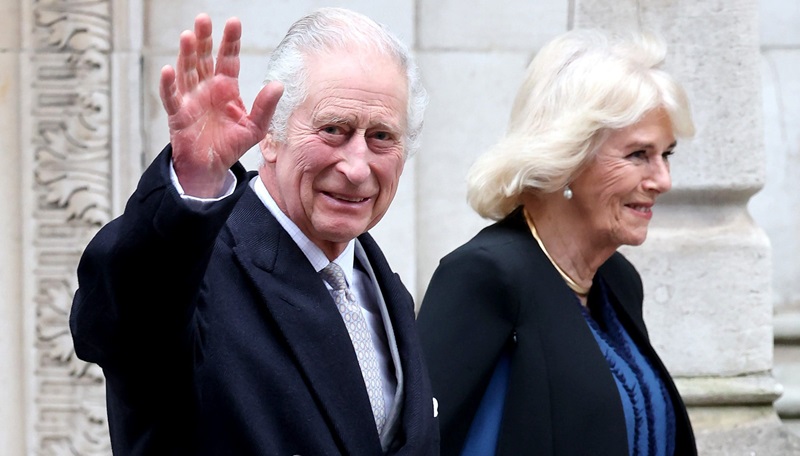King Charles’s health journey has been a tumultuous one, filled with ups and downs that have shaped his life in unexpected ways. From his struggles with sausage fingers to his battle with cancer, the King has faced numerous health challenges with courage and resilience. His journey began with the sudden onset of sausage fingers, a condition that left his hands swollen and painful. Despite the discomfort, King Charles persevered and sought treatment to alleviate his symptoms. However, his health troubles were far from over.
As time went on, King Charles’s health took a turn for the worse when he was diagnosed with cancer. The news came as a shock to both the King and his subjects, who had grown accustomed to seeing him as a pillar of strength and vitality. The diagnosis forced King Charles to confront his mortality and face the reality of his own vulnerability. Despite the gravity of his situation, the King remained steadfast in his resolve to fight the disease with all his might.
Throughout his battle with cancer, King Charles’s determination and courage never wavered. He endured rounds of grueling treatment, facing each challenge head-on with unwavering strength. His resilience inspired those around him, serving as a beacon of hope in the face of adversity. Despite the toll that the disease took on his body, King Charles remained resolute in his determination to overcome it and emerge victorious.
As the King’s health journey unfolded, it became clear that his struggles had not only shaped him but also brought him closer to his subjects. The outpouring of support and well-wishes from the people of his kingdom served as a source of comfort and strength for King Charles during his darkest moments. The bonds of loyalty and love that had been forged over the years were strengthened by the King’s willingness to share his journey with his subjects, creating a sense of unity and solidarity that transcended his own personal struggles.
In the end, King Charles’s health journey served as a testament to the power of resilience, courage, and community. Despite facing seemingly insurmountable odds, the King never lost sight of his determination to overcome his health challenges and emerge stronger on the other side. His journey from sausage fingers to cancer was a testament to his unwavering spirit and indomitable will, inspiring all who knew him to face their own struggles with courage and grace. King Charles’s legacy as a warrior and survivor will forever be remembered by those who witnessed his remarkable journey.

Early Health Issues and Public Perception
In the past, early health issues were often misunderstood and stigmatized by the public. People with mental illnesses or physical disabilities were often seen as weak or flawed, leading to discrimination and social isolation. Additionally, diseases such as leprosy or tuberculosis were viewed with fear and ignorance, causing those affected to be shunned by society.
The lack of understanding and education about these health issues only served to perpetuate negative stereotypes and attitudes. Furthermore, early medical treatments and interventions were often crude and ineffective, leading to further mistrust and skepticism from the public. As a result, individuals facing these health challenges often suffered in silence, afraid to seek help or support.
It wasn’t until advancements in medical science and increased awareness campaigns that public perception began to shift towards a more compassionate and understanding stance. Today, we continue to strive for greater acceptance and support for those facing early health issues, recognizing that everyone deserves access to quality care and respect, regardless of their health status. By promoting empathy and education, we can work towards creating a more inclusive and supportive society for all individuals, regardless of their health challenges.
The Impact of Arthritis on King Charles’s Life
King Charles’s life has been greatly impacted by arthritis, a painful and debilitating condition that affects his joints. The constant pain and stiffness make it difficult for him to move around freely and perform everyday tasks. As a result, he has had to make significant adjustments to his lifestyle in order to manage his symptoms and maintain his quality of life.
Simple activities like walking, climbing stairs, or even getting out of bed have become a struggle for King Charles. He has had to rely on mobility aids such as a cane or wheelchair to help him get around, which has made him feel dependent and limited in his independence. The chronic pain and fatigue associated with arthritis have also taken a toll on his mental and emotional well-being, leading to feelings of frustration, sadness, and isolation.
Despite these challenges, King Charles has shown remarkable resilience and determination in facing his condition head-on. He has sought out various treatments and therapies to help alleviate his symptoms and improve his mobility. Through physical therapy, medication, and lifestyle changes, he has been able to better manage his arthritis and maintain a semblance of normalcy in his daily life.
While arthritis has undoubtedly had a profound impact on King Charles’s life, he has not let it define him or hold him back from pursuing his passions and goals. He continues to show strength and perseverance in the face of adversity, inspiring those around him to do the same.

Health Scares and Their Media Coverage
Health scares often dominate the media landscape, with sensational headlines and alarming reports grabbing the attention of the public. These stories can spread fear and panic, leading to widespread concern and confusion among the population. While it is important for the media to report on potential health threats, the sensationalized coverage can sometimes do more harm than good.
In some cases, the media may exaggerate the risks or provide inaccurate information, leading to unnecessary anxiety and stress. Additionally, the constant barrage of health scare stories can desensitize the public and make it difficult to discern genuine threats from exaggerated ones. It is crucial for the media to strike a balance between informing the public and causing unnecessary alarm.
By providing accurate and balanced reporting, the media can help to educate the public and empower individuals to make informed decisions about their health. Ultimately, it is important for the media to approach health scares with caution and responsibility, ensuring that the information they provide is accurate, clear, and helpful to the public.
Recent Developments in King Charles’s Health
King Charles’s health has been a topic of concern in recent months, with reports of various developments causing speculation among the public. The latest news surrounding his health suggests that there have been some improvements in his condition, with sources close to the King indicating that he has been responding well to treatment.
However, there are also reports of setbacks in his recovery, with some sources suggesting that his health may be deteriorating rapidly. This conflicting information has left many wondering about the true state of King Charles’s health and what the future may hold for him. Despite the uncertainty surrounding his condition, there is no denying that his health is a matter of great importance to the kingdom, and any developments in this area are closely monitored by the public and the royal court.
As the King’s health continues to be a topic of interest and concern, it is clear that the coming days will bring further updates and revelations about his condition. The people of the kingdom can only hope for the best and pray for a swift and full recovery for their beloved monarch.

Future Implications and Health Management
The future implications of health management are vast and varied, with potential impacts on individuals, communities, and society as a whole. As advancements in technology continue to revolutionize the healthcare industry, the way we approach and manage our health is evolving rapidly.
From wearable devices that track our physical activity and monitor our vital signs to personalized genetic testing that can identify potential health risks, the possibilities for improving health outcomes are expanding. However, with these advancements come ethical considerations surrounding privacy, consent, and data security.
How will this influx of personal health data be stored and protected? Who will have access to this information, and how will it be used? These questions are crucial to consider as we move towards a more data-driven approach to health management.
Furthermore, the increasing prevalence of chronic diseases such as diabetes, heart disease, and obesity presents a significant challenge for health management in the future. As the global population continues to grow and age, the burden of managing these conditions will only become greater.
Healthcare systems will need to adapt and innovate to meet the growing demand for services and resources, while also addressing the underlying social determinants of health that contribute to the development of chronic diseases. This will require a shift towards more preventative and holistic approaches to healthcare, focusing on early intervention and lifestyle modifications to improve overall health outcomes.
In conclusion, the future implications of health management are complex and multifaceted, with both opportunities and challenges on the horizon. As we navigate this rapidly changing landscape, it is essential to consider the ethical, social, and economic implications of our decisions and actions. By embracing innovation, collaboration, and a commitment to improving health outcomes for all, we can work towards a future where healthcare is accessible, effective, and equitable for everyone.

